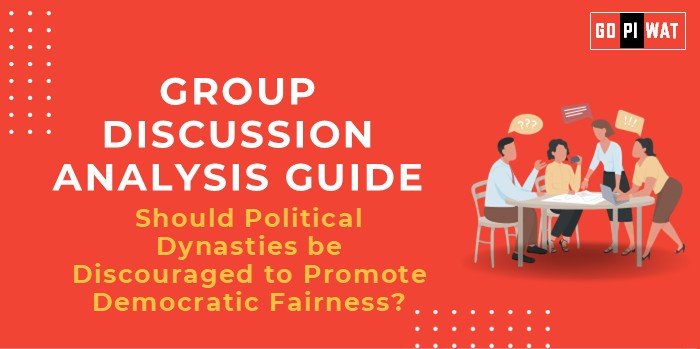📋 Group Discussion (GD) Analysis Guide: Should Political Dynasties Be Discouraged to Promote Democratic Fairness?
🌐 Introduction to the Topic
- 📖 Opening Context: Political dynasties dominate leadership across the globe, raising questions about meritocracy, representation, and democracy. Countries like India, the USA, and the Philippines witness families wielding disproportionate influence in politics.
- 💡 Topic Background: Political dynasties emerge when family members maintain successive or simultaneous positions in government. While dynasties ensure political stability and continuity, critics argue they erode democratic principles by promoting nepotism and unequal opportunities.
📊 Quick Facts and Key Statistics
- 🌍 Global Perspective: 50% of world leaders in 2023 hailed from political dynasties (Source: UNDP, 2024).
- 🇮🇳 India’s Political Landscape: 43% of Lok Sabha MPs (2019) were from political families.
- 📉 Voter Sentiments: 70% of Indian voters believe dynastic politics hampers meritocracy (Source: Pew Research, 2023).
- 🌐 Global Comparisons: 40% of the Philippines’ top legislators are from political families, while the Bush and Kennedy families symbolize the trend in the US.
👥 Stakeholders and Their Roles
- 👨👩👧👦 Political Families: Consolidate power, offer continuity, but often sideline new talent.
- 🏛️ Political Parties: May rely on dynasties for stability and electoral success.
- 🗳️ Citizens: Bear the consequences of dynastic politics through limited choices.
- 🕵️ Election Commissions: Regulate and ensure fair election practices.
🏆 Achievements and Challenges
✨ Achievements:
- ✅ Stability: Dynasties often represent political continuity (e.g., Nehru-Gandhi family in India).
- 🤝 Familiarity: Dynasties resonate with voters due to established trust.
- 📜 Legacy Policies: Established leaders can better sustain long-term initiatives.
⚠️ Challenges:
- ❌ Meritocracy Erosion: Nepotism sidelines competent, non-dynastic candidates.
- ⚖️ Unequal Opportunity: Power is centralized within elite families.
- 🛡️ Governance Issues: Risk of entitlement and lack of accountability.
Global Comparisons:
- 🇸🇬 Success: Lee family in Singapore, where meritocracy coexists with dynastic politics.
- 🇵🇭 Challenge: Philippines’ dynasties, linked to corruption and inequality.
Case Study: The Nehru-Gandhi family’s declining influence in Indian politics post-2014 highlights a shift toward performance-based expectations.
📄 Structured Arguments for Discussion
- 👍 Supporting Stance: “Discouraging political dynasties fosters meritocracy, ensuring leadership is based on ability rather than inheritance.”
- 👎 Opposing Stance: “Political dynasties provide stability and continuity, enabling focused long-term policy implementation.”
- ⚖️ Balanced Perspective: “While dynasties can leverage experience, a system of checks and balances ensures democratic fairness.”
💬 Effective Discussion Approaches
- 🎯 Opening Approaches:
- 📚 Highlight statistics on dynastic dominance and its impact on democracy.
- 💡 Contrast a dynastic leader’s long-term legacy with the fresh perspectives of non-dynastic politicians.
- 🤝 Counter-Argument Handling:
- ✅ Present evidence on how democratic systems benefit from diverse representation (e.g., Arvind Kejriwal’s rise as a non-dynastic leader in India).
🔎 Strategic Analysis of Strengths and Weaknesses
- 💪 Strengths: Familiarity with governance, voter trust, and political stability.
- ❌ Weaknesses: Nepotism, reduced competition, and risk of entitlement.
- 🌟 Opportunities: Encourage youth and women’s participation to break elite dominance.
- ⚠️ Threats: Loss of public trust in democratic processes, potential voter apathy.
🎓 Connecting with B-School Applications
- 🌍 Real-World Applications: Governance models, public policy strategies to promote inclusivity.
- 📝 Sample Questions:
- 💡 “What are the ethical implications of dynastic politics?”
- 🔍 “Can political continuity outweigh the disadvantages of dynastic dominance?”
- ✨ Insights for B-School Students:
- 📖 Explore merit-based frameworks in leadership selection.
- 📊 Analyze governance challenges from dynastic systems in emerging economies.


